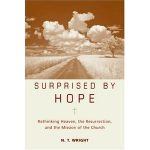Wright, N. T. Surprised by Hope: Rethinking Heaven, the Resurrection, and the Mission of the Church. Harper One, 2008. ISBN: 978-0-06-155182-6.
N.T. (Nicholas Thomas) Wright is the one of the world’s top Biblical scholars and has been called “the world’s leading New Testament scholar” by Newsweek. He taught New Testament studies for twenty years at Cambridge, McGill, and Oxford Universities. Wright is currently the Bishop of Durham for the Church of England. He is best known for his prolific writing. Recent books include Simply Christian, The Challenge of Jesus, and What Saint Paul Really Said. For more information and to read some of his work, visit the unofficial N.T. Wright site.
In Surprised by Hope, Wright seeks to accomplish three tasks:
- Explore the scope of the normative current Christian understanding of afterlife by showing its errors and limitations through an exploration of the biblical and historical evidence of and a theological explanation about Jesus’ resurrection.
- Further explain his own resurrection theology and make a case that it is the most faithful option to the New Testament.
- Demonstrate how the future hope of resurrection impacts the world in the present.
So What?
Following the book’s subtitle, one could assume some of Wright’s take aways or so whats are:
- Rethinking heaven – Christian hope isn’t about going to heaven after you die, but rather “life after life after death.” Heaven isn’t a place that believers will rise to reside in, but is a reality that will be blended with earth.
- Rethinking the resurrection – The resurrection of Jesus is central to our faith and is both real and bodily. It is key to understanding our future bodily resurrection.
- Rethinking the mission of the church – The church is called to live in this in between time when the kingdom is already beginning and not yet realized. As such, it must be busy about helping enact the kingdom of God in the present.
Think about your own assumptions of heaven, resurrection and the mission of the church. Are they based on Scripture, tradition, culture or are you unaware of the sources you have used to construct your assumptions?

